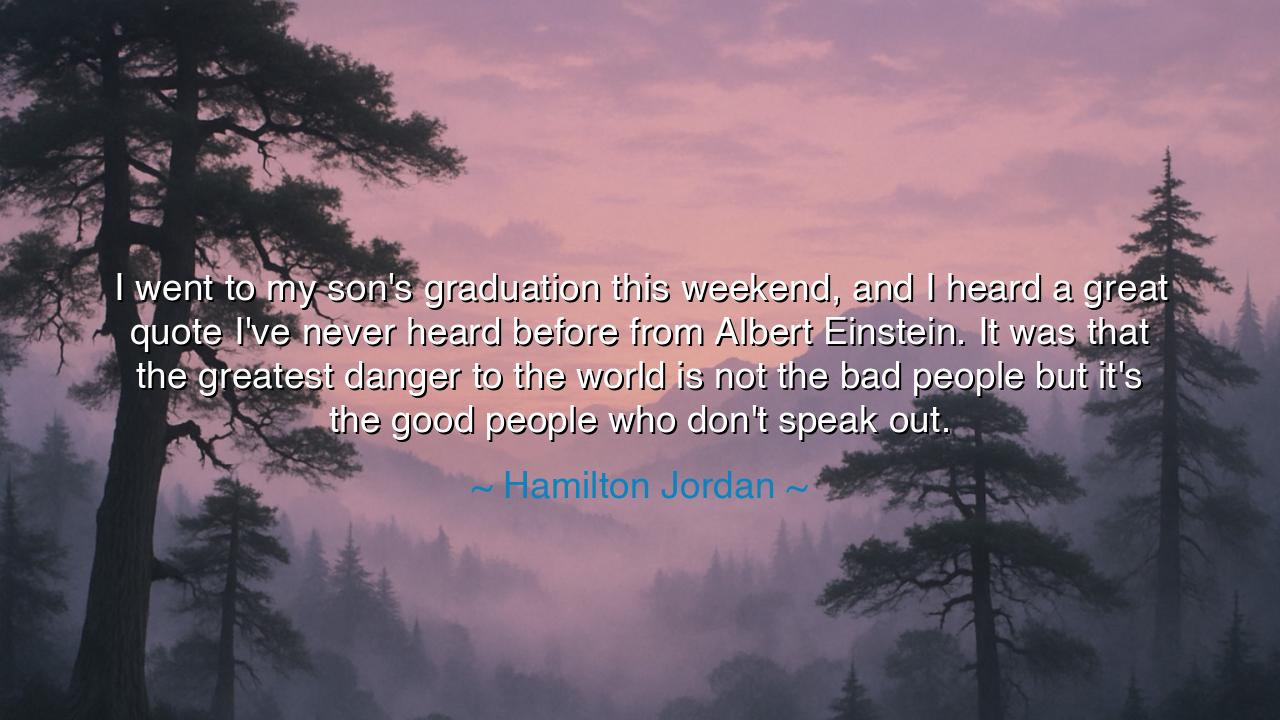
I went to my son's graduation this weekend, and I heard a great
I went to my son's graduation this weekend, and I heard a great quote I've never heard before from Albert Einstein. It was that the greatest danger to the world is not the bad people but it's the good people who don't speak out.






Hear now the solemn and stirring words of Hamilton Jordan, a man of insight and service, who spoke with reverence of a truth that echoes through every age: “I went to my son’s graduation this weekend, and I heard a great quote I’ve never heard before from Albert Einstein. It was that the greatest danger to the world is not the bad people but it’s the good people who don’t speak out.” Within this reflection, both simple and profound, lies the eternal warning of silence — the peril of goodness that hides itself, of conscience that fears to act. These words are not only an echo of Einstein’s wisdom, but a mirror held up to every soul that chooses comfort over courage.
The meaning of this quote burns like a beacon across the generations. It reminds us that evil thrives not because it is strong, but because it is unopposed. The bad people, those who exploit, deceive, or destroy, are few — but their success depends on the inaction of the many who know better and say nothing. To be good is not enough; goodness must be alive, awake, and unafraid to speak. Hamilton Jordan, hearing this truth at his son’s graduation, understood its weight — that the world his son would inherit would be shaped not only by the wickedness of a few, but by the silence of the many. The true measure of character is not in quiet virtue, but in the courage to defend it when the world demands a voice.
The origin of this idea belongs to the mind and conscience of Albert Einstein, the scientist who unraveled the mysteries of the cosmos yet feared most the moral collapse of humankind. Having fled the rise of tyranny in Europe, Einstein saw firsthand how evil gains ground when good people remain still — when fear, apathy, or politeness silence the defenders of justice. From the ashes of war and oppression, he warned that neutrality in the face of wrongdoing is itself a form of complicity. His message was not to scholars alone, but to every citizen, every student, every graduate stepping into a world still shadowed by injustice. And in Jordan’s retelling, this ancient truth becomes freshly alive — a father passing on the torch of moral responsibility to the next generation.
Consider, O listener, the story of Dietrich Bonhoeffer, the German theologian who dared to oppose the evil of his age. When the world around him bowed to tyranny, Bonhoeffer refused to remain silent. He spoke out against hatred, against cruelty, and against the complacency of those who claimed to be “good” yet did nothing. For his voice, he was imprisoned and executed — yet his words outlived him, bearing the immortal reminder that “silence in the face of evil is itself evil.” He was one of those whom Einstein described — a good man who spoke when others would not, proving that courage is not measured by success, but by the refusal to be silent in the presence of wrong.
The wisdom in Hamilton Jordan’s reflection is also personal and timeless. At a graduation, where young minds look toward the promise of the future, he was reminded that the world’s survival depends not only on knowledge, but on conscience. It is easy to celebrate achievement — degrees earned, honors bestowed — but far harder to prepare souls for the moral trials that await them. The graduation ceremony, that symbol of transition from learning to life, becomes in his telling a moment of awakening: a call for the new generation to be more than successful — to be just, courageous, and unafraid to stand against the tide.
The lesson here resounds with clarity: silence, when truth demands speech, is the ally of harm. Each generation must decide whether to be the echo or the voice, the watcher or the doer, the one who regrets or the one who acts. Goodness, if it remains quiet, becomes as powerless as darkness pretending to be light. The world does not need more people who wish for peace; it needs those who will protect it, speak for it, and defend it — even when their voices tremble.
So take this, O reader, as both warning and charge: never let your goodness be muted by fear. When you see injustice, raise your voice; when you witness cruelty, speak compassion; when truth is endangered, be its defender. Do not wait for others to act, for the silence of one heart can echo across the ages. Let your courage be louder than your comfort, and your conscience louder than your doubt. For as Hamilton Jordan learned, and as Einstein taught before him — the fate of the world does not rest in the hands of the wicked, but in the voices of the righteous. And if those voices rise together, even the darkest age will tremble and give way to light.






AAdministratorAdministrator
Welcome, honored guests. Please leave a comment, we will respond soon